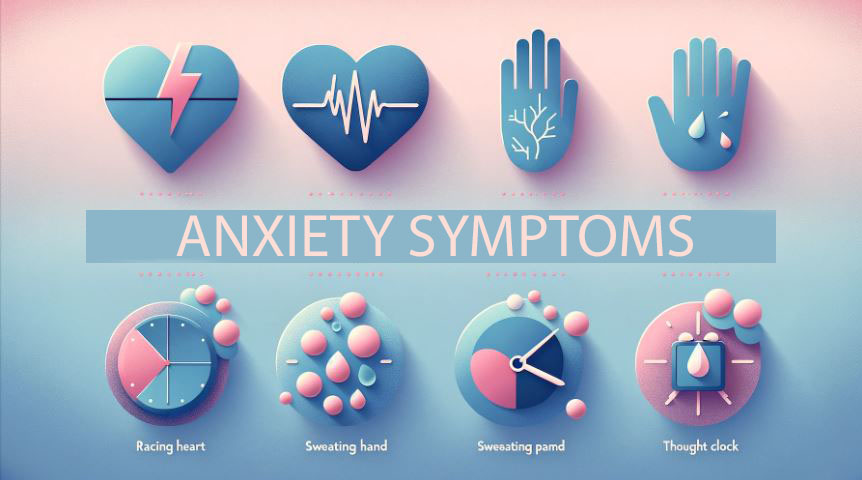
What are the symptoms of anxiety?
Behavioural Symptoms of Anxiety
Anxiety is a common mental health issue that affects millions of people worldwide. It can manifest in various ways, including physical, emotional, and behavioural symptoms. In this article, we will focus on the behavioural symptoms of anxiety and how they can impact daily life.
One of the most common behavioural symptoms of anxiety is avoidance. People with anxiety may avoid certain situations or activities that trigger their anxiety. This can include social events, work meetings, or even leaving the house altogether. Avoidance can lead to isolation and further exacerbate feelings of anxiety.
Another behavioural symptom of anxiety is irritability. People with anxiety may feel on edge or easily agitated, leading to outbursts of anger or frustration. This can strain relationships with friends, family, and co-workers, as others may not understand the underlying cause of the irritability.
Procrastination is also a common behavioural symptom of anxiety. People with anxiety may struggle to complete tasks or make decisions due to fear of failure or perfectionism. This can lead to feelings of guilt and self-criticism, further fuelling the cycle of anxiety.
Restlessness is another behavioural symptom of anxiety. People with anxiety may have difficulty sitting still or relaxing, constantly feeling the need to be doing something. This can lead to insomnia and fatigue, as the body is constantly in a state of heightened alertness.
People with anxiety may also engage in repetitive behaviours or rituals as a way to cope with their anxiety. This can include things like counting, tapping, or checking things multiple times. While these behaviours' may provide temporary relief, they can ultimately reinforce feelings of anxiety and make it harder to break free from the cycle.
Finally, people with anxiety may experience difficulty concentrating or making decisions. Anxiety can cloud the mind and make it hard to focus on tasks or process information. This can impact work performance, academic success, and overall quality of life.
Overall, the behavioural symptoms of anxiety can have a significant impact on daily life. It is important for people experiencing these symptoms to seek help from a mental health professional. Therapy, medication, and lifestyle changes can all be effective in managing anxiety and improving overall well-being.
If you or someone you know is struggling with anxiety, know that you are not alone. There is help available, and it is possible to overcome anxiety and live a fulfilling life. Remember to be kind to yourself and prioritize self-care as you navigate the challenges of anxiety.
Emotional Symptoms of Anxiety
Anxiety is a common mental health issue that affects millions of people worldwide. It can manifest in various ways, including emotional symptoms that can be challenging to deal with. Understanding these emotional symptoms is crucial in recognizing and managing anxiety effectively.
One of the most common emotional symptoms of anxiety is excessive worry. People with anxiety often find themselves constantly worrying about various aspects of their lives, such as work, relationships, or health. This worry can be overwhelming and can interfere with daily activities, making it difficult to concentrate or relax.
In addition to excessive worry, anxiety can also cause feelings of restlessness and irritability. People with anxiety may feel on edge or agitated, making it hard to relax or enjoy activities they once found pleasurable. This restlessness can lead to difficulty sleeping, which can further exacerbate anxiety symptoms.
Another emotional symptom of anxiety is a sense of impending doom or danger. People with anxiety may feel as though something terrible is about to happen, even if there is no rational reason for these feelings. This sense of impending doom can be terrifying and can lead to panic attacks in some cases.
Anxiety can also manifest as feelings of panic or fear. People with anxiety may experience sudden and intense feelings of fear or panic, often accompanied by physical symptoms such as a racing heart, sweating, or trembling. These panic attacks can be debilitating and can make it challenging to function in everyday life.
In addition to these emotional symptoms, anxiety can also cause feelings of helplessness or hopelessness. People with anxiety may feel as though they have no control over their thoughts or emotions, leading to a sense of despair. This feeling of helplessness can be overwhelming and can make it challenging to seek help or support.
Furthermore, anxiety can also cause feelings of isolation or loneliness. People with anxiety may withdraw from social activities or relationships, fearing judgment or criticism from others. This isolation can worsen anxiety symptoms and can make it harder to seek help or support from loved ones.
Overall, the emotional symptoms of anxiety can be challenging to deal with and can significantly impact a person’s quality of life. It is essential to recognize these symptoms and seek help from a mental health professional if you are experiencing them. With the right support and treatment, it is possible to manage anxiety effectively and improve your overall well-being. Remember, you are not alone in your struggles, and there is help available to support you through this difficult time.
Physical Symptoms of Anxiety
Anxiety is a common mental health condition that affects millions of people worldwide. While it is normal to feel anxious from time to time, excessive or prolonged anxiety can have a significant impact on a person’s quality of life. One of the ways anxiety manifests itself is through physical symptoms. These symptoms can vary from person to person, but they often include a combination of physical sensations that can be distressing and uncomfortable.
One of the most common physical symptoms of anxiety is a racing heart. When we feel anxious, our body’s fight or flight response is triggered, causing our heart rate to increase. This can make us feel like our heart is pounding in our chest, which can be quite alarming. In addition to a racing heart, some people may also experience palpitations, where they feel like their heart is skipping a beat or beating irregularly. These sensations can be frightening and may exacerbate feelings of anxiety.
Another physical symptom of anxiety is shortness of breath. When we are anxious, our breathing may become shallow and rapid, making it difficult to take deep breaths. This can lead to feelings of breathlessness or even hyperventilation, which can be very distressing. Some people may also experience chest tightness or pain, which can further exacerbate feelings of anxiety and panic.
Muscle tension is another common physical symptom of anxiety. When we are anxious, our muscles tend to tense up as part of the body’s fight or flight response. This can lead to muscle stiffness, aches, and pains, particularly in the neck, shoulders, and back. Some people may also experience tremors or shaking, especially in their hands or legs. These physical sensations can be uncomfortable and may contribute to feelings of restlessness and agitation.
Gastrointestinal symptoms are also common in people with anxiety. Many people experience stomach aches, nausea, or diarrhoea when they are feeling anxious. This is because anxiety can affect the functioning of the digestive system, leading to symptoms such as indigestion, bloating, or changes in bowel habits. Some people may also experience a loss of appetite or weight changes as a result of their anxiety.
In addition to these physical symptoms, anxiety can also manifest in other ways, such as dizziness, light-headedness, or headaches. Some people may also experience sweating, hot flashes, or chills when they are anxious. These physical sensations can be distressing and may interfere with a person’s ability to carry out their daily activities.
It is important to note that not everyone with anxiety will experience all of these physical symptoms. Some people may only experience a few of them, while others may experience a combination of several. It is also important to remember that these physical symptoms are not a sign of weakness or a lack of control. They are a natural response to stress and can be managed with the help of a healthcare professional.
If you are experiencing physical symptoms of anxiety, it is important to seek help from a healthcare provider. They can help you determine the underlying cause of your symptoms and develop a treatment plan to help you manage your anxiety. Remember, you are not alone, and there is help available to support you through this challenging time.
Conclusion
Symptoms of anxiety can include excessive worry, restlessness, irritability, difficulty concentrating, muscle tension, and trouble sleeping.
